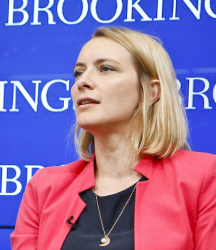

9:30 am EDT - 11:00 am EDT
Past Event
To inform the public conversation on how to best reopen around the world after COVID-19, the Brookings Institution published a volume of essays, “Reopening the World: How to Save Lives and Livelihoods,” which examines reopening efforts in several key countries and regions and offers insight and recommendations for the road ahead. On June 19, the Foreign Policy program at Brookings convened five of the project’s authors for a webinar exploring how countries around the globe have responded to the pandemic.
Brookings President John R. Allen gave opening remarks emphasizing the need for international cooperation and collective solutions to put an end to the global crisis. Senior Fellow and Director of Research for Foreign Policy Michael O’Hanlon moderated the panel, starting by asking each panelist about how things stand in the countries they study, and how they believe the world is handling the pandemic in terms of recovery and reopening. The conversation then moved to a discussion about lessons learned and how countries can collaborate more effectively, as well as where global leadership can — and should — come from.
Senior Fellow David Dollar opened by outlining the status of China, noting that reopening the economy is going “surprisingly well” and that certain sectors of the economy even experienced positive growth in June. He emphasized, however, that eliminating the virus will mean continuing to test people, and that China must control the virus via “constant vigilance and social distancing” until there is a vaccine, with the understanding that recovery is “going to be a long, painful process” requiring policy solutions to help workers and businesses adjust.
The importance of masks, social distancing, tracking, testing, and an eventual vaccine were common themes among the panelists. Though France was one of the hardest-hit European countries, Visiting Fellow Celia Belin explained that its three-fold reopening strategy of mask wearing and social distancing, testing, and isolation upon infection have proven successful. Regarding South Korea — lauded for its success in containing the virus — Senior Fellow Jung Pak highlighted the country’s innovative tactics, from its framework for using surveillance technology to track infections to its apt public awareness campaigns and mask vending machines.
The need for increased local, national, and international cooperation was another common takeaway. Belin emphasized “the absolute need to have universal access to tests, treatments, and vaccines,” which she urged can only be done through collective action. Dollar underlined the particular importance of effective cooperation between the United States and China and warned that a lack thereof will lead to even more devastating economic crises in places where poverty is already high. Likewise, Senior Fellow Anthony Pipa called for integrating cities into the policy conversations, as they are hit the hardest by the virus and will be at the forefront of vaccine distribution. Moreover, he pointed out that local leadership “tends to enjoy higher levels of trust amongst their constituents,” and mayors have seen success through transparency and direct communication with their communities.
Senior Fellow and Interim Vice President for Foreign Policy Suzanne Maloney underscored the critical role of strong leadership in her analysis of Iran, which she said presents a “cautionary tale.” Explaining how various factors, including stringent U.S. sanctions and a tendency to view the virus as a Western conspiracy, resulted in minimal containment efforts and maximum devastation, Maloney concluded that one of the takeaways from the Iranian side “is simply how difficult any kind of measures like this are to impose unless you have full consensus on the part of the leadership and the capacity to absorb a significant economic hit.”
To wrap up the discussion, O’Hanlon asked the panelists how they think democracies have done, as forms of government, in addressing the pandemic. While Dollar pointed out that “most of the success stories are democracies,” Pak closed the conversation by asserting that “we shouldn’t put this [as] authoritarian versus democracy, but I think South Korea has done a really good job of showing what a democracy can do and as others have mentioned, it’s about government, trust, and transparency.”
Moderator

Panelist


Mark MacCarthy
July 11, 2025

Barry G. Rabe
July 11, 2025

Eduardo Levy Yeyati
July 10, 2025